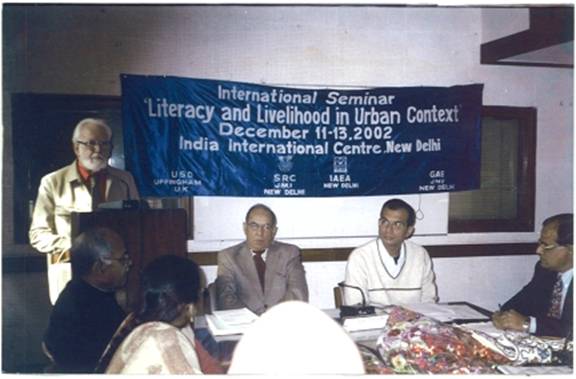The Group of Adult Education (GAE) is one of the six special UGC-supported Programmes/Units of the School of Social Sciences (SSS). The GAE is one of the vibrant research, training, information, documentation and publishing nodal centres on literacy, adult education, non-formal education, education and lifelong learning, development education and continuing education across the country. By linking educational research, policy and practice in all these areas, GAE makes a special contribution in enhancing access to learning, and improving the environment and quality of learning in various sub-disciplines of adult education and lifelong learning for all.
GAE provides academic, research, training and consultancy services in literacy, non-formal education, adult and lifelong learning, sustainable livelihoods programme, development education, consumer education and awareness to various stakeholders including citizens, government agencies, and NGOs. GAE works in close cooperation with the National Directorate of Adult Education and Planning Commission (both under Union Government of India) and with its sister departments in the University of Delhi and Jamia Milia and Islamia.
Above: Prof. Alan Rogers (Uppingham Seminars, UK) speaking at the International Seminar. Seated are: Prof. Shahid Mehdi (Vice-Chancellor of JMI), Mr. Jagan Mathew (Director General, National Literacy Mission, Government of India), & Prof S.Y. Shah .
Course title: Citizenship Education and Globalization: Contemporary Issues and Perspectives
Course Code: AE 301
Course Teacher: Dr. Ajay Kumar, Associate Professor, Room 212, GAE, SSS-1 Building
Course content
The course begins with lectures/assignments on central topics within the social sciences with relevance to citizenship education, including democracy, politics, citizens, citizenship, state, elements of state, nation-state, welfare state, identity and political/social inclusion and exclusion.
The lectures/assignments will help to give students a theoretical and methodological basis for the work with their assignments. In working on the assignment the students use various sources in connection to practical public problems and issues visible locally, regionally, nationally and internationally, e.g. analysis of CAA, NRC, NPR, Delhi Riots of 2020, UAPA, JNU community problems like fee hike, plagiarism, road rage in Delhi, domestic violence, gender violence, child abuse, sexism in advertising, refugees problem, corruption, climate change, floods, droughts, negative use of social media, threats to democracy by forces of fundamentalism and populism, etc .
_*The more formal topics are:*_
1. What is Citizenship Education (in short, CE), meaning and scope of CE, future of CE
2. What is citizen, citizenship, state and nation state, elements of state, welfare state, neo-liberal state, definition of politics, identity and identity politics, social and political exclusion/inclusion
3. History of citizenship and Citizenship Education
4. Typologies of Citizenship and Citizenship Education;
T.H. Marshall' conception of citizen's and rights, critiques of Marshall
5. Citizenship Education, elements of Citizenship Education, Practical issues and problems of contemporary significance (locally, nationally and internationally)
6. Globalization: it's nature, contemporary issues, nature of global interdependence, Global Citizenship Education (GCE) or Cosmopolitan Citizenship, challenges for democratic education for citizenship in the era of globalisation.
_*Learning outcomes:*_
Give students an introduction to key topics in the social sciences, a greater understanding of practical problems and issues through work with their own assignment/ project and an introduction to academic writing.
_*Learning methods and activities:*_
Lectures/seminar presentation/assignments and supervision on the topic/project assignment.
_*Compulsory End Semester assignments:*_
1. Submission of two compulsory term papers (2500 words each for term papers) or one term paper and a book review (1200 words for the book review).
2. One compulsory paper/seminar presentation on any one term paper or book review submitted.
Both the above (1 & 2) will be of 50% value.
3. End semester examination of 50% value.
